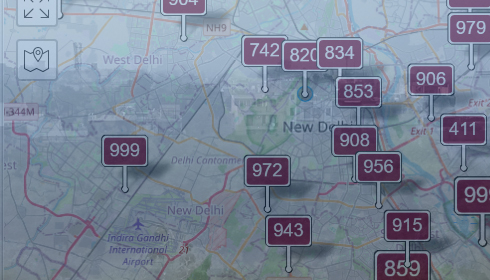
North India’s Pollution Crisis Worsens, Delhi AQI Remains Grave Concern
North India is experiencing a catastrophic pollution crisis, with Air Quality Index (AQI) levels in Delhi-NCR and adjoining regions reaching hazardous levels. On Tueaday morning, Ghaziabad had an unprecedented AQI of 999, putting it in the hazardous category, while Noida did only slightly better, with AQI readings of 701 and 183, indicating severe pollution.
The AQI scores in Central and North Delhi, classified as very bad to severe, also showed disturbing trends, ranging from 324 to 416. Meanwhile, South and West Delhi had AQI values ranging from 240 to 302, while East Delhi's ranged from 250 to 295, placing it in the bad to extremely poor catagory. The decreasing air quality poses serious health hazards, especially to children, the elderly, and anyone with pre-existing respiratory or cardiac disorders.
Delhi Chief MInister Atishi accepted the implementation of Graded Response Action Plan (GRAP-IV) limits and forwarded the proposal to the Lieutenant Governor for final approval. Delhi Environment Minister Gopal Rai stated that GRAP-IV measures will take effect immediately.
According to Rai, the state government has enacted a series of rigorous measures under GRAP-IV to combat the pollution levels. The Delhi government has fully restricted all construction and demolition operations to reduce dust pollution, thereby eliminating one of the major sources of particulate matter in the air of the capital. Additionally, Rai told that vehicle limitations have been implemented, forbidding the admission of non-essential diesel vehicles, with the exception of those powered by greener alternatives such as BS-VI diesel, CNG, or electricity. Recognizing the serious health hazards posed by the terrible air quality, the government issued order suspension of schools for junior classes, while it has been made mandatory for those in senior classes to wear N95 masks.
To enhance the health response, the government has established a dedicated task force to address pollution-related health emergencies, guaranteeing immediate medical care to those affected, said Rai.
"The entire North India has now fallen into the grip of severe pollution," Gopal Rai claimed.
"The elderly are having difficulties breathing, and children's schools are being closed. This situation has escalated into a public health crisis," he added.
However he claimed that stubble burning incidences in Punjab have come down from 47,000 in 2022 to 7,500 in 2024. However, he claimed that incidents are growing in Uttar Pradesh.
While the Delhi government has implemented GRAP-IV and other emergency measures, Minister Rai has urged the central government to work with neighboring states to address the problem more thoroughly. He advocated for efforts such as artificial rain and greater enforcement of anti-pollution standards.
The region risks not only a thick layer of smog but also the threat of long-term health consequences. For the time being, residents of Delhi-NCR can only hope that these efforts will give some relief.